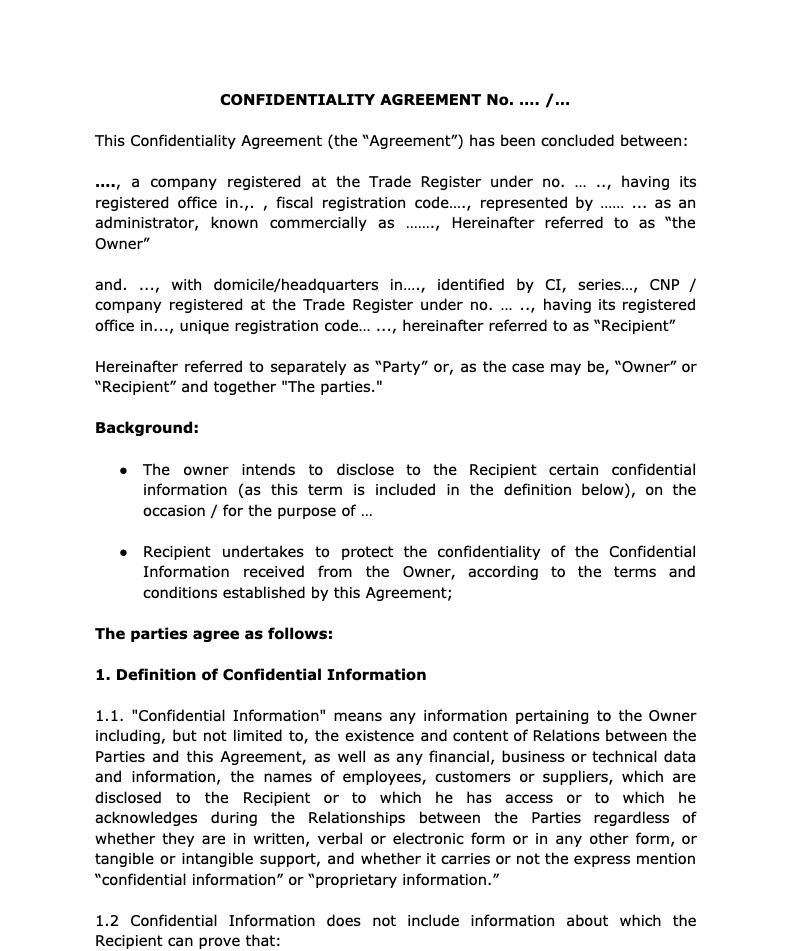What Legal Matters Should I Check Before Starting my Business?
A comprehensive analysis of what you should verify about your previous contractual relations before starting your business as a freelancer or setting up your online business
Even if we don't always consider it necessary, we must verify our previous contractual relations before diving into entrepreneurship life. And no, it is not about legally registering your entity or invoicing as a freelancer. It is something much more subtle. It is looking at your previous contractual relationships and checking if something can hinder you from providing the services you want.
So,
-
Unless you are a student that has their first internship ever, this article is for you;
-
Even if you are a student taking on your first job or contract, continue reading to know how to deal with your future contractual relationships.
1. Non-Compete Agreements or Clauses
Applicable usually to employees, a non-compete clause appears in employment contracts. It restricts an employee to provide the same services for a similar profession or trade that competes with their former employer. The purpose is for the employee not to take the information learnt inside the previous company and start their own business. Or for them to not give the trade secret to a competitor that will have a competitive advantage.
Non-compete agreements can be signed either when entering a contractual relationship either after the employment contract is signed, as a supplement to it.
The main characteristics of a non-compete clause or agreement are:
- It refers to the same set of knowledge, plans, schedules and trade secrets employees find out about while exercising their work.
- It lasts for a specific time after the termination of the employment contract.
- It has a geographical limitation: the employee is under non-compete obligation for businesses or clients from a particular country, city, continent, on a radius of X km from the employee's headquarters or even worldwide (if allowed by law).
When starting your own business, be it a freelancer or a typical company, you must read all your previous employment and contractual agreements. Verify if you agreed to any non-compete clause and check if you are still under its limitations. For example, if there has passed enough time or maybe you moved outside its geographical application. The same applies if you know you have signed a non-compete agreement with any entity.
There are specific mechanisms to use to get out of a non-compete clause in case it provokes difficulties. Avoteca’s vetted lawyers can help to find the best solution so that you continue providing the services you want, to the clients you wish, in the locations you desire. All this, without the danger of being asked for compensation at a particular moment, in the future.
2. Insurance Clauses
If you worked for technological startups, or perhaps as a designer or a UX/UI specialist, do not be surprised by what you find in your agreements.
Before starting your business, you should verify if you must keep yourself insured for a specific time. There might be issues that appear after you no longer work there for reasons related to the service you provided in the past.
Verifying can help you twofold:
-
In case you undertake professional liability insurance, you can sign up for both coverages, trying to reach a deal with your insurance company.
-
You can understand your obligations and protect yourself to not harm your activity because of something you signed in the past.
3. Confidentiality Agreements or Clauses
The confidentiality clause might be enshrined in an employment contract or service agreement you concluded with your previous contractual partner. The purpose is to prevent you from leaking or using information not available to the public, such as internal policies, trade secrets, company ownership, a partnership for future deals, or development strategies.
Sometimes, the confidentiality clause is confused with the non-compete clause. However, confidentiality clauses have a broader purpose. They are not limited only to the use of secret information to a competitor but to whoever might be interested in them, directly or indirectly.
A Confidentiality Agreement which is also known as non-disclosure agreement or simply as an NDA usually comprises details such as:
-
What it is considered to be 'confidential information' upon which the contract will apply;
-
The period for the confidentiality obligation;
-
What are the exemptions from the non-disclosure obligation;
-
What you need to do after the contractual relationship or confidentiality obligation terminates.
The confidentiality clauses might block you from the very exercise of your profession or activity. Similarly, they can impose you to do some actions every time a possible disclosure might occur.
The lawyers from the Avoteca community are specialised in dealing with contractual relationships and business matters. They can help you figure out your future obligations, how they impact your business, and when they terminate.
Simultaneously, a confidentiality agreement is an essential document to have at the beginning of your business. Its purpose is to protect you from anyone who wants to steal your idea. It also shows others how significant your activity or startup is.
We prepared a short template that you can use before starting to collaborate with a lawyer for more personalisation on your business's specifics.

4. Non-solicitation Clauses
When you enter into an employment agreement or terminate one, the employers might ask you to sign a non-solicitation clause.
A non-solicitation clause prevents you from 'soliciting' customers, colleagues, employees, or suppliers from your former employer or contractual partner and persuading them to start commercial relationships with you.
A non-solicitation clause might:
-
Limit the discussions with the former employer's direct partners or only entering into agreements with them.
-
Prohibit specific ways to contact former customers, colleague employees, or suppliers - by phone, email, or even face-to-face meetings.
Analysing a signed non-solicitation clause and its particularities helps you to know how to start reaching clients and collaborators or recruit future employees for your activity.
At Avoteca, our vetted business lawyers can help you understand your obligations from your former partnerships. They can advise you on what actions to take next and how to prepare for your future business - due diligence activities, entity creation, compliance regulations, contractual relationships and on-going advice for your collaborations.
(The template does not represent a legal consultancy and does not give raise to any obligations to anyone)
Ana-Maria Drăgănuță Briard
Lawyer & Co-founder of Avoteca | Podcaster at Legal Tale Podcast
16 March 2021
